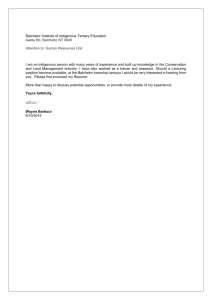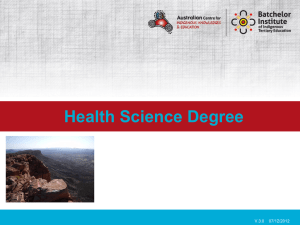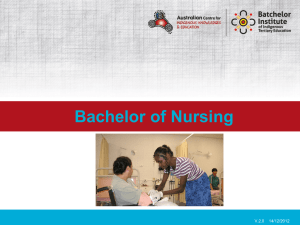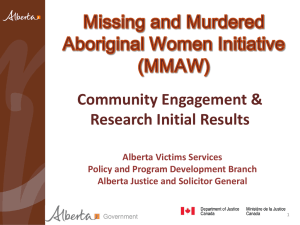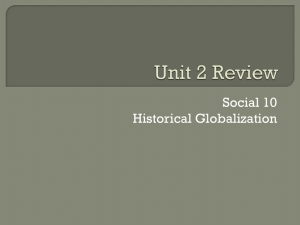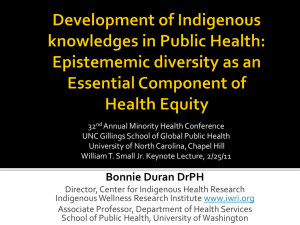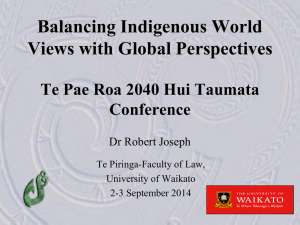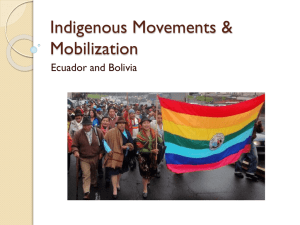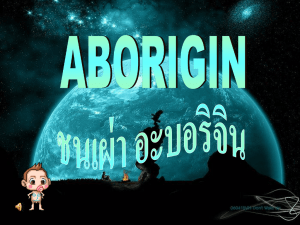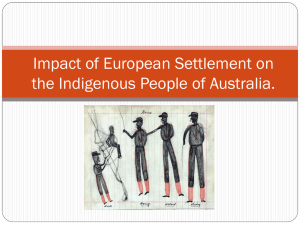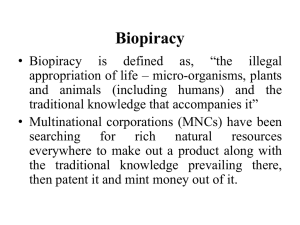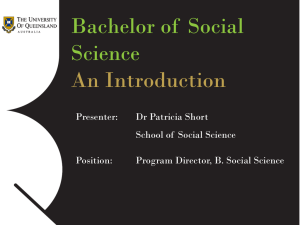BHSc-PP-2014-v3.1 - Batchelor Institute of Indigenous Tertiary
advertisement
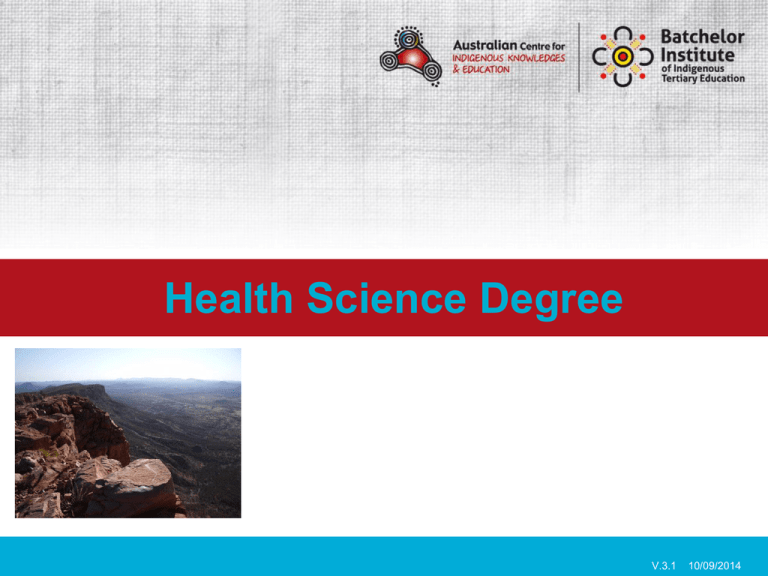
Health Science Degree V.3.1 10/09/2014 Batchelor Institute Overview Batchelor Institute of Indigenous Tertiary Education is an Indigenous only training facility, that caters specifically to the needs of Indigenous learners. Indigenous people come from across Australia to study at one of our campus locations in the Northern Territory, either in Batchelor (100km south of Darwin) or the Desert Peoples Centre, located in Alice Springs. Batchelor Institute Overview Two principles underpin all aspects of the Institute. 1 Cultural interaction and cross-cultural learning that follows a ‘Both-ways’ philosophy which enables exploration of Indigenous Australian traditions of knowledge and Western academic disciplinary positions and cultural contexts. 2 Through its work and its courses, Batchelor Institute affirms the aspiration to self-determination and employment held by Indigenous Australians. ACIKE Overview The Australian Centre for Indigenous Knowledges and Education (ACIKE) is a joint initiative between Charles Darwin University (CDU) and the Batchelor Institute of Indigenous Tertiary Education (BIITE). The aim is to provide a shared facility for the delivery of a specific range of Higher Education and Post Graduate study options which address the needs of Indigenous Australia. ACIKE Overview Through the ACIKE partnership BIITE will now be able to offer a more comprehensive range of Higher Education study options, including dedicated courses specifically designed to support Indigenous students. When you enrol in an ACIKE course you will have student privileges at both BIITE and CDU including computer access, student email, learning spaces, Academic Support Advisors, disability support (if needed) and tutorial support. Bachelor of Health Science Course Overview What is Health Science? The Bachelor of Health Science is a course that provides students with the knowledge and skills required to work in areas of Health Promotion, Health Services Management and Occupational Therapy. The course has a particular focus on the provision of culturally safe primary health care with an emphasis on understanding the challenges of working in the diverse contexts of urban, rural and remote communities. What is Health Science? Culturally safe health care is the provision of care that is sensitive to the historical, social and political context and knowledge and practices of health consumers, as well as the Western knowledges and practices that inform healthcare in Australia and beyond. Course Overview Core units within the Bachelor of Health Science ensure students gain the knowledge and understanding to support successful health service delivery for diverse populations, and particularly for Indigenous Australians. The course also introduces students to theoretical knowledge and perspectives informing contemporary community work practice and the concepts and processes relating to social change. Course Overview Students will become familiar with a number of models and theories of community work and approached to community development, as well as developing a beginning awareness of the skills necessary for effective and progressive community-focused practice. Course Delivery The course has a range of flexible multi modal delivery options including: •Workshops – student will have the opportunity to attend workshops based at the Desert Peoples Centre Alice Springs and the Batchelor Institute campus, Batchelor (100km south of Darwin). Course Delivery • Learnline – students will use this computer program to access information about the units that they are enrolled in. This information will include unit information, topic lecture notes, assessment details, discussion boards, readings and staff contact numbers. As Learnline is used with all units in the course it is important that students own or have access to a computer and the internet. Course Delivery • External – Students who are working or may have other commitments may choose to study externally. This means that they do not have to come to workshops but can do their study using the learnline system. Regular contact with Bachelor of Health Science staff will enable them to discuss their progress and any issues they may have in regards to their study. Course Structure The Bachelor of Health Science requires the student to enrol in and complete a total of 24 units. Full time students study up to 8 units per year and it usually takes 3 years to complete the course. The course contains: • 2 Common Units •14 Core Units •6 Specialist Electives •2 Electives Specialist Stream Students are required to choose one of the specialist streams offered within the Bachelor of Health Science and enrol in the units offered. They are: • Health Promotion • Health Services Management • Occupational Therapy Career Pathways There are many career opportunities open to graduates on completion of the degree including: • Health Promotion Officer • Community Development Officer • Public Health Coordinator • Smoking Cessation Coordinator • Health Policy Officer • Evaluation Co-ordinator • Sexual Health Educator • Aboriginal Health Centre Management • Remote Area Health Manager • Aboriginal Male Health Coordinator • Health Project Manager • Senior Indigenous Health Promotion Officer / Coordinator • Sport & Recreation Officer Career Pathways Many of these positions are available in both Government and Non-Government Agencies and can be based in urban, rural and some remote communities. Completion of the degree will also offer the student the opportunity to enrol in post graduate education programs such as Post graduate certificates, Diplomas and Masters degrees that will further enhance their employment opportunities and careers. Travel • All travel costs, including flights and transfers are met by Batchelor Institute. • All travel arrangements are made by our student travel department. • Students are notified of their travel arrangements a week before the workshop by the staff in the travel department. • On arrival at the airport residential staff will be there to meet you and transport you to your accommodation. Accommodation • You will be accommodated in a single room or twin share room at the Residential Campus. • The campus has a library and computer access for students who wish to study after class and in the evening or at the weekend. In Alice Springs • You will be transported to and from the Desert Peoples Centre during workshop. • The accommodation is near the town centre. Meals • Breakfast, morning tea, lunch and dinners are provided on the campus. • Desert People Centre Campus also hosts the Irrante Café. • Batchelor Campus students can access the Batchelor township shops, only minutes away. • All meal costs are included with your workshop if you are a residential student. Student Financial Support • As a full time or part time student you should be eligible for financial assistance through the Federal Government • Full time students studying 3 units or more per semester should be entitled to full ABSTUDY support • Full time students may also be eligible for other assistance including scholarships Student Scholarships You may also be eligible for a scholarship to help you study. There are Indigenous Commonwealth Scholarships that may assist you: • Commonwealth Education Cost Scholarship (CECS) • Commonwealth Accommodation Scholarship • Indigenous Access Scholarship (IAS) • See CDU webpage for more information www.cdu.edu.au or speak to one of our Academic Advisors How to Apply • The South Australian Tertiary Admissions Centre (SATAC) receives and processes applications for admission for the Australian Centre for Indigenous Knowledges and Education (ACIKE). • To apply for a course through SATAC you will need to submit your application online through their website www.satac.edu.au. • See the SATAC brochure on our website Alternative Entry Most people know that the usual way of gaining entry to a university course is to study a Year 12 program, however there are other ways of getting into the course including: • Special Tertiary Admissions Test • Complete a TAFE/VET Certificate IV or Diploma course • Undertake a University bridging course • Alternative Indigenous Entry Pathway Alternative Indigenous Entry Pathway If you are thinking of higher education but don’t know if you meet the university’s entry requirements then the IAEP might be your answer. The program provides Indigenous people with the opportunity to participate in an assessment program that offers a study pathway to achieve success in your chosen field at ACIKE. If you are to be considered as an applicant, you would need to travel to either Darwin or Alice Springs in the Northern Territory to attend a two day assessment. Centrelink can assist you with travel costs and accommodation. Further information Contact us or look at this website: http://www.cdu.edu.au/community/indigenous_alternative_entry.html Preparation for Tertiary Success BIITE through ACIKE offers a FREE PTS program, especially designed for Indigenous Australians. If you have not studied in a while or you did not complete year 12 or do not think you achieved a high enough score and are unsure about whether you can succeed in a Higher Education program, our PTS program helps you to develop the skills, knowledge and confidence you need to be successful at university. Further information: http://www.cdu.edu.au/cdu-acike/pts/ Contact Us Health Science Team Lynn Moloney Coordinator– Bachelor of Health Science Division of Higher Education and Research Batchelor Institute of Indigenous Tertiary Education FREECALL 1800 677 095 Direct: (08) 89 51 8343 email: lynn.moloney@batchelor.edu.au Contact Us Academic Support Advisors Michael Keating Academic Advisor – Alice Springs Division of Higher Education and Research Batchelor Institute of Indigenous Tertiary Education FREECALL 1800 677 095 Direct: (08) 89 51 8350 email: michael.keating@batchelor.edu.au Thank you for your time and good luck with your future studies
